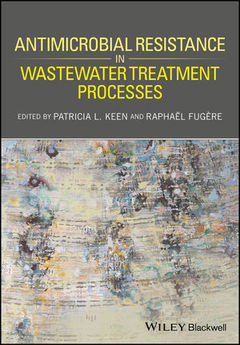Antimicrobial Resistance in Wastewater Treatment Processes
Coordonnateurs : Keen Patricia L., Fugère Raphaël

Antimicrobial resistance is arguably the greatest threat to worldwide human health. This book evaluates the roles of human water use, treatment and conservation in the development and spread of antimicrobial resistance. Designed as a companion volume to Antimicrobial Resistance in the Environment (Wiley-Blackwell, 2012), this book is a multi-disciplinary synthesis of topics related to antimicrobial resistance and wastewater treatment processes.
Antimicrobial Resistance in Wastewater Treatment Processes assembles detailed discussions written by many of the world's best-known experts in microbiology, civil engineering, chemistry, environmental science, public health and related fields. The book presents a collection of subjects that includes:
- Current knowledge of the role of the environment in development and spread of antimicrobial resistance
- Chemical analysis of antibiotics in environmental samples
- Molecular methods for analysis of antimicrobial resistance genes
- Advanced wastewater treatment processes and antimicrobial resistance effects
- Public perception of risk related to health consequences of antimicrobial resistance
- Public health implications of antimicrobial resistance with focus on wastewater treatment processes
Antimicrobial resistance has gained a foothold in the global consciousness as a serious public health threat. There is a much greater appreciation for the role of the environment in the dissemination of antimicrobial resistance and the effects of pollutants that can potentially promote development of resistance in bacteria. Contaminants released from wastewater treatment plants are a concern. In Antimicrobial Resistance in Wastewater Treatment Processes, readers will be guided through examinations of the current science related to this important health issue.
List of Contributors ix
Preface xiii
Préface xvii
About the Cover Artist xxi
List of Abbreviations xxiii
1 Antimicrobial Resistance Genes and Wastewater Treatment 1
Mehrnoush Mohammadali and Julian Davies
2 When Pathogens and Environmental Organisms Meet: Consequences for Antibiotic Resistance 15
Jose Luis Martinez and Fernando Baquero
3 One Health: The Role Wastewater Treatment Plants Play as Reservoirs, Amplifiers, and Transmitters of Antibiotic Resistance Genes and Antibiotic Resistant Bacteria 35
Marilyn C. Roberts
4 Assessing the Impact of Wastewater Treatment Plants on Environmental Levels of Antibiotic Resistance 55
Jessica Williams]Nguyen, Irene Bueno, and Randall S. Singer
5 Navigating through the Challenges Associated with the Analysis of Antimicrobials and Their Transformation Products in Wastewater 73
Randolph R. Singh, Rachel A Mullen, and Diana S. Aga
6 Metagenomic Approaches for Antibiotic Resistance Gene Detection in Wastewater Treatment Plants 95
Ying Yang and Tong Zhang
7 Antimicrobials and Antimicrobial Resistant Bacteria in Australia 109
Andrew J. Watkinson and Simon D. Costanzo
8 The Mobile Resistome in Wastewater Treatment Facilities and Downstream Environments 129
Roberto B. M. Marano and Eddie Cytryn
9 Bacterial Diversity and Antibiotic Resistance Genes in Wastewater Treatment Plant Influents and Effluents 157
Veiko Voolaid, Erica Donner, Sotirios Vasileiadis, and Thomas U. Berendonk
10 The Effect of Advanced Treatment Technologies on the Removal of Antibiotic Resistance 179
Popi Karaolia, Stella Michael, and Despo Fatta]Kassinos
11 Antimicrobial Resistance Spread Mediated by Wastewater Irrigation: The Mezquital Valley Case Study 207
Melanie Broszat and Elisabeth Grohmann
12 Antimicrobial Resistance Related to Agricultural Wastewater and Biosolids 219
Lisa M. Durso and Amy Millmier Schmidt
13 Environmental Antibiotic Resistance Associated with Land Application of Biosolids 241
Jean E. McLain, Channah M. Rock, and Charles P. Gerba
14 High Throughput Method for Analyzing Antibiotic Resistance Genes in Wastewater Treatment Plants 253
Johanna Muurinen, Antti Karkman, and Marko Virta
15 Antibiotic Resistance and Wastewater Treatment Process 263
Thi Thuy Do, Sinéad Murphy, and Fiona Walsh
16 Antibiotic Pollution and Occurrence of Bacterial Antibiotic Resistance Genes in Latin American Developing Countries: Case Study of the Katari Watershed in the Bolivian Highlands 293
Denisse Archundia, Celine Duwig, Jean M.F. Martins, Frederic Lehembre, Marie]Christine Morel and Gabriela Flores
17 Antimicrobial Resistance in Hospital Wastewaters 309
Judith Isaac]Renton and Patricia L. Keen
18 Curbing the Resistance Movement: Examining Public Perception of the Spread of Antibiotic Resistant Organisms 321
Agnes V. MacDonald and Patricia L. Keen
19 Public Health Consequences of Antimicrobial Resistance in the Wastewater Treatment Process 329
Patricia L. Keen, Raphaël Fugère, and David M. Patrick
Index 339
Patricia Keen is a researcher and instructor in the Department of Civil Engineering at the University of British Columbia. She has more than 30 years of extensive experience in environmental chemistry, toxicology, ecosystem health, environmental risk assessment, resource management and environmental impacts of contaminants. The principle focus of her research is related to antimicrobial resistance in environment and together with Dr. Mark Montforts, she is the co-editor of the book published in 2012 by Wiley Blackwell entitled Antimicrobial Resistance in the Environment. Patricia is actively engaged in water and wastewater research at UBC and maintains a consulting role in projects related to environmental health and integrated resource management.
Raphaël Fugère is a biologist and environmental engineer with more than seven years of experience in designing, building, optimizing, operating and troubleshooting drinking water and wastewater treatment plants, from small to very large-scale. He has experience in process related research as well as on the practical side associated with industrial and municipal plants. He has actively participated in roles involving water management governance for small and mid-sized cities, ensuring coordination between agricultural needs, municipal needs, industrial needs and the need for resource conservation. Some of those efforts date back to 2006 where, even at the time, the need for fracturing "fracking" fluid was putting pressure on the scarce water resources in northern British Columbia. Raphaël maintains a support role on various research projects at conducted at UBC.
Date de parution : 12-2017
Ouvrage de 384 p.
16.8x24.6 cm
Thèmes d’Antimicrobial Resistance in Wastewater Treatment Processes :
Mots-clés :
health; antimicrobial resistance; threat; water; human; book; roles; use; conservation; spread; resistance; environment; companion; wileyblackwell; antimicrobial; volume; multidisciplinary synthesis; treatment; topics



